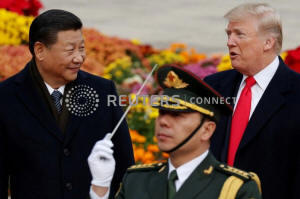|
Trump calls trade war with China 'little
squabble,' says talks ongoing
 Send a link to a friend
Send a link to a friend
 [May 15, 2019]
By Alexandra Alper and Susan Heavey [May 15, 2019]
By Alexandra Alper and Susan Heavey
WASHINGTON (Reuters) - U.S. President
Donald Trump on Tuesday called the trade war with China "a little
squabble" and insisted talks between the world's two largest economies
had not collapsed, as investors remained on guard for a further
escalation of tit-for-tat tariffs.
Trump, who has railed against what he describes as China's unfair trade
practices and threatened to impose punitive levies on all its imports,
softened his tone in a series of remarks expressing optimism about
reaching a trade deal with Beijing.
"We're having a little squabble with China because we've been treated
very unfairly for many, many decades," Trump told reporters, referring
to U.S. complaints about Chinese intellectual property and subsidy
practices.
Trump also denied talks with China had broken down after Washington
punctuated two days of negotiations last week with another round of
tariffs on Chinese imports, with Beijing following suit on Monday with
higher tariffs on U.S. goods.

"We have a dialogue going. It will always continue," said the U.S.
president, who has announced plans to meet Chinese President Xi Jinping
at a G20 summit in Japan late next month. Trump described the dialogue
with China as "very good" and touted his "extraordinary" relationship
with Xi.
Earlier, Trump tweeted that the United States would make a deal with
China when the "time is right" and said that would happen "much faster"
than thought.
Global stock markets, which have seen a sharp selloff in the past week
on the back of rising U.S.-China tensions, rebounded. Major U.S. stock
indexes were up more than 1%, recovering some of their losses on Monday.
The U.S. dollar rose against a basket of currencies.
Earlier on Tuesday, Chinese Foreign Ministry spokesman Geng Shuang told
a daily news briefing that it was his understanding that China and the
United States had agreed to continue "pursuing relevant discussions."
"As for how they are pursued, I think that hinges upon further
consultations between the two sides," Geng said.
U.S. Treasury Secretary Steven Mnuchin will plan for a trade meeting in
China at some point, a U.S. Treasury spokesman said.
U.S. agricultural products have been targeted by China's retaliatory
tariffs, and American farmers, a key political constituency for Trump,
are increasingly frustrated with the failure of the two sides to find a
solution to the dispute.
Soybeans , which was the most valuable U.S. export crop, bounced off a
decade low on Tuesday as the market's focus shifted to weather-related
planting delays that could reduce the crop size. Some analysts said the
worst of the trade news was priced into the market.

In a tweet earlier on Tuesday, Trump appealed to China to buy U.S. farm
products.
On Monday, he said his administration would provide about $15 billion in
aid to farmers whose products were targeted by Chinese tariffs. He did
not provide details on the plan, which follows $12 billion in similar
farm aid last year.
[to top of second column]
|

President Donald Trump takes part in a welcoming ceremony with
China's President Xi Jinping at the Great Hall of the People in
Beijing, China, November 9, 2017. REUTERS/Damir Sagolj/File Photo

There are concerns that the pain from tariffs could spread to the
broader U.S. economy, with businesses raising prices on a range of
consumer goods. Consumer spending accounts for two-thirds of U.S.
economic activity.
Senate Majority Leader Mitch McConnell said on Tuesday that "nobody
wins a trade war" but he hoped Trump's tactics in negotiations China
would put the United States in a better position to move talks
forward with Beijing.
TARIFFS IN HAND
Trump, however, is still dangling the prospect of higher tariffs on
Chinese goods.
As negotiations toward resolving the U.S.-China trade war stalled
last week, the United States raised the pressure by increasing
tariffs to 25% from 10% on a previous, $200 billion list of Chinese
imports.
China retaliated on Monday with higher tariffs on a revised list of
$60 billion worth of U.S. products
Trump could launch 25% tariffs on another $300 billion worth of
Chinese goods when he meets Xi next month. The list includes a wide
range of consumer goods, from cellphones and computers to clothing
and footwear, but it excludes pharmaceuticals, some specialty
compounds and rare-earth minerals.
At the same time, China is vowing not to succumb to such pressure.
China's Foreign Ministry said on Tuesday it hoped the United States
did not "underestimate China's determination and will to safeguard
its interests."

A further escalation of the trade war could disrupt global supply
lines and damage an already slowing world economy, sending financial
markets into a tailspin. The U.S. economy, while growing at a
healthy clip, could come under pressure.
Sources have said the trade talks hit an impasse after China tried
to delete commitments from a draft agreement that said its laws
would be changed to enact new policies on issues from intellectual
property protection to forced technology transfers.
Geng put the blame on Washington for going back on its word in some
previous rounds of talks, including last May, when the two sides
reached an agreement in Washington but then the United States backed
out a few days later.
(Reporting by Alexandra Alper and Susan Heavey; Additional reporting
by Makini Brice and David Lawder in Washington; Julie Ingwersen in
Chicago; Ben Blanchard in Beijing and Noah Sin in Hong Kong; Writing
by David Lawder and Paul Simao; Editing by Susan Thomas and Lisa
Shumamker)
[© 2019 Thomson Reuters. All rights
reserved.]
Copyright 2019 Reuters. All rights reserved. This material may not be published,
broadcast, rewritten or redistributed.
Thompson Reuters is solely responsible for this content. |